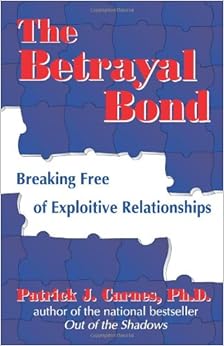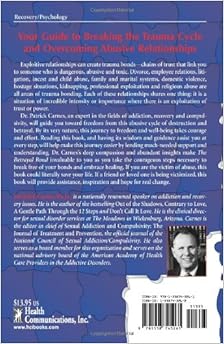






| Amazon Price | New from | Used from |
|
Unknown Binding
"Please retry"
|
—
|
— | $8.00 |

Product Details
Would you like to update product info or give feedback on images?.
|
Patrick J. Carnes, Ph.D., is an internationally known authority on addiction and recovery issues. He has authored more than twenty books including the bestselling titles Out of the Shadows: Understanding Addiction Recovery, Betrayal Bond, Don't Call It Love, and the first edition of The Gentle Path Through the Twelve Steps. Dr. Carnes' research provides the architecture for the 'task model' of treating addictions that is used by thousands of therapists worldwide and many well-known treatment centers, residential facilities, and hospitals. He is the executive director of the Gentle Path Program, which specializes in dedicated treatment for sexual addiction. For more information on his work and contributions, log onto patrickcarnes.com and sexhelp.com. You can also find him on Facebook and Twitter: @drpatrickcarnes.
Lois was only twenty-two. Fresh out of college with a business degree in hand, she had landed a fabulous job with a large printing firm. She was ecstatic. She worked hard. The company gave her a car. She was attractive and fun. Her hard work and enthusiasm made up for her inexperience. Plus, she had support. Her boss, the marketing director, was also young by many people+s standards. Nearing thirty, she already had eight years of business experience. The company had grown dramatically and many chalked it up to her skill and untiring efforts. She took Lois under her wing and they became good colleagues and friends.
One day the marketing director left the office in tears. A memo came around saying she had resigned. Lois tried to reach her at home but there was no response to the messages she left. The president of the company asked Lois to come to his office. He talked of his sadness that the marketing director was no longer with the company. He also said that he now had a problem; he had no one to run marketing. He offered Lois the job.
Lois immediately accepted. She had mixed emotions because of the loss of her supervisor and because little was known about why she left, just the tears. Yet Lois knew this was a tremendous opportunity for her. The president told her that he had taken a chance on her previous supervisor being so young and it worked out well. Lois received a bonus and a significant raise. She threw herself into her work.
A week later the president asked Lois to his office to review her first week+s efforts. Lois could tell he was not totally pleased with what she had done but was unsure what he wanted. Then he launched into a description of what made her predecessor successful. Critical were her former bossÆs ôspecialö relationships with customers. In fact, for the buying agents of their key accounts she would perform oral sex. ThatÆs how the company kept business. As he talked, Lois went numb with disbelief. She came out of it when he said that their customers liked office sex in certain ways and he would show her how. Then he approached her. Lois stood up and told him that she would not do this for any price. She grabbed her personal belongings and left the company in tears.
She was devastated. Friends and family gathered around Lois. They found her a therapist. The therapist said that she had experienced an assault and would need to work it through or her life would suffer. Lois pulled herself together and responded by saying that it was only a proposition and she would simply forget about it.
The therapist was right. About a month after leaving her job, Lois started having nightmares about the company president and his office. She had difficulty motivating herself to find work. Interviews went badly. She moved back in with her parents, which added even more stress. She shut down sexually. She was critical of her boyfriend who, in fact, was very supportive. That relationship ended. She found herself continually angry with her former supervisor. She berated herself for being naive enough to think that the companyÆs success had anything to do with marketing. She was angry with her former employer yet obsessed with what was happening in the company. The betrayal for Lois was that nothing was as it had seemed. None of her ability, hard work, enthusiasm or creativity mattered. She had believed that people had taken her seriously. In reality management had been grooming her to be the company courtesan. How could she ever trust anyone again?
Lois was also a victim of her own ability to cope. At the time of the betrayal, she felt that it was something she could handle. Calling on ancient family traditions of facing adversity, toughing it out and forging ahead, she dismissed the significance of what had happened. Only in therapy did she start to understand that she had been victimized and admit that it was traumatic for her. Like many of us, Lois learned that she looked right at it and did not see it.
Stress becomes traumatic when danger, risk, fear or anxiety is present. For Lois, she lost in a matter of minutes all that she thought she had. Further, the insidious fear was planted that the only way she could be successful was by using her body. Her talent for business didnÆt matter. Plus, the unwanted advance of someone who had so much power over her well-being placed her in jeopardy. Yet Lois had defenses that helped her cope with the problem. She tended to normalize and minimize. Her body, however, knew.
When in jeopardy, our body mobilizes its defenses. All our physical systems achieve high states of readiness. Adrenaline flows. The electrochemical reactions between synapses in the brain accelerate. ItÆs just like an automobile driven at the maximum possible speed. The sustained, flat-out performance pushes the carÆs mechanical system past its limits. Pretty soon, things start to break down. Our bodies and minds will react the same way. When pushed past their limits, they begin to fall apart. Unlike a car, however, our bodies and minds can regenerate and recover. Some traumas that occur as a result of betrayal create damage that is residual. That is, we do not see it or understand it until later. Some traumas, especially over time, can alter how our systems operate.
Two factors are essential in understanding traumatic experiences: how far our systems are stretched and for how long. Figure 1.1 helps us understand how these two factors interact. Some events happen only once or just a few times, but the impact is so great that trauma occurs. The experience Lois had with the president of the company only lasted a few minutes, but the impact was significant and enduring. Rape, accident, assault and some types of child molestation fit this extreme form of trauma. So would being terminated without warning from a job after years of loyal service and excellent performance.
Some trauma experiences are relatively minor, but they happen every day. The hurt accumulates. Many acts of child neglect, for example, in themselves are not that serious. Every parent has moments of not being able to cover all the bases. A consistent pattern of neglect, however, creates incredible anxiety in a child and leaves serious lifelong wounds. Other examples include living in a toxic marriage or working in a toxic corporation. Little acts of degradation, manipulation, secrecy and shame on a daily basis take their toll. Trauma by accumulation sneaks up on its victims.
The compromises we make to trauma can deaden us over time. As one man described his recovery from a traumatizing marriage: ôIt was a full year after we split when I realized that my back felt different. It was relaxed and I could bend without effort. I had spent so many years braced for the next outburst, my back muscles were always tensed up. I never realized that while I was married.ö ItÆs like walking into a room with a bad smell. The longer you stay in the room, the more the smell will seem to dissipate. Your olfactory system actually adjusts to the offensive odor. ItÆs only by leaving the room that you will recover your sensitivity to the odor. ItÆs the same with high stress, danger or anxiety; your body and mind will adjust—and pay for it. Only after being away from traumatic circumstances will your sensitivity return.
Betrayals that cause horrendous and long-lasting traumas are the worst. Such was the Holocaust, or Vietnam, or Russia after StalinÆs purge followed by the Nazi invasion. These emotional scars can be so severe that generations descended from those surviving will react in ways that still reflect the original trauma. No amount of what appears to be normal makes it safe. Patterns and attitudes evolve far beyond the individual and are incorporated into the fabric of family and society.
While this book will focus on the insane loyalties of betrayal bonding, it is important to understand the other seven dysfunctional options that people have to cope with betrayal. These options often become significant allies of one another. So if you have one, you probably have some of the others as well. In the interests of understanding how these work together we need to understand each separately.
¬1997 Patrick J. Carnes. All rights reserved. Reprinted from The Betrayal Bond by Patrick J. Carnes, Ph.D. No part of this publication may be reproduced, stored in a retrieval system or transmitted in any form or by any means, without the written permission of the publisher. Publisher: Health Communications, Inc., 3201 SW 15th Street, Deerfield Beach, FL 33442.